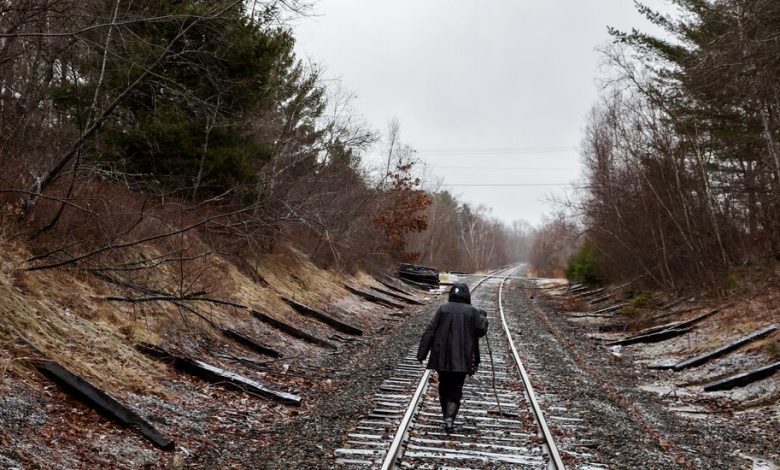In Maine, a Mother’s Lonely Quest for Her Missing Son

For nine straight mornings last December, and again in the fading light of dusk, Tammy Lacher Scully left her home in Belfast, Maine, and drove a mile to the convenience store that doubles as a bus station.
There, she watched the passengers step off the bus from Bangor, scanning every face, knitted hat and parka. She was looking for her son Graham Lacher, 39, who had fled from a Bangor psychiatric hospital six months earlier, walked into the woods nearby and disappeared.
Ms. Scully, 65, knew her son was unlikely to be on the bus. But she thought of this daily ritual as a kind of novena: a prayer repeated for nine days to appeal a misfortune or request a special favor. Getting in the car, gripping the wheel, taking action.
Eighteen months after he vanished, she and her husband are still searching for Mr. Lacher, whose autism and schizophrenia were diagnosed when he was a teenager. They have crisscrossed the sprawling state of Maine, checking and rechecking dozens of homeless encampments and shelters. Andthey have chased hundreds of tips from some of the 6,000 strangers who follow their search on Facebook.
Ignoring those who advise her to accept her loss, Ms. Scully has come to inhabit a limbo that is little recognized by outsiders but painfully real for the families of people who remain missing for years.
Early on, she realized it was up to her to keep the search active. And like others in her position, she is both unwilling to stop looking and unable to move on.
“I am mourning his absence,” she has gotten used to saying. “I won’t mourn his loss unless there’s solid evidence that he is gone.”

Brandy Baron-St. Louis, left, handed Jack Scully a flier with information on Mr. Lacher, to put on a community board near the Kennebec River Rail Trail in Gardiner, Maine.Credit…Ashley Conti for The New York Times
Across the United States, the number of active missing persons cases has ticked up steadily in the last five years, to 97,000 in 2022 from 85,500 in 2018. While the overall volume of missing person reports has been shrinking since the 1990s, as cellphones and other technology have made it easier to track people down, some recent research suggests an increase in the number of vulnerable people who are disappearing.
They include people without housing, victims of abuse, and those with mental illness or substance use disorders. As social problems have intensified, remote and rural places have not been spared. In Bangor, the city of 32,000 where Mr. Lacher was last seen, more unhoused people are living outdoors, where harsh winters put their lives at risk.
Mr. Lacher could be eking out an invisible existence on the fringes of the city — or halfway across the country.
When adults are reported missing in Maine, as in other places, search efforts by the police are typically short-lived. After that, it is often unclear whose job it is to try to find them.
A spokeswoman for the Maine State Police referred questions about missing persons cases to the chief medical examiner’s office, which said it gathers “biometric information” on missing people, such as dental records, to help identify recovered remains. But it does not conduct searches. Nor does the agency track how many cases are reported and resolved each year, making it hard to discern if the problem is worsening.
A federal database, the National Missing and Unidentified Persons System, was created in 2007 to record all such cases in one place. But only 13 states require the police to use it.
Laura Supica, a state representative from Bangor, said she thought the police should follow clearer protocols to ensure consistency. “Not everybody has a mom like Tammy,” she said.
Ms. Scully, who ran a wholesale wine business with her husband, Jack, before they retired, is practical and realistic; she knows police resources are limited. But she dwells on what she sees as initial missteps, including delays in deploying dogs trained in scent-specific searches; issuing a statewide alert; and assigning detectives.
A spokesman for the Bangor police said the department had communicated with Ms. Scully about her concerns. “We, too, would like to see the family reunited,” the spokesman, Sgt. Jason McAmbley, said. “This is still an open and active investigation.”
The simplest reason Ms. Scully sees to keep searching is that her son’s body has not been found. Beyond that, his vulnerability spurs her on. Mr. Lacher is intelligent, she said — an artist and poet fluent in Spanish and Latin — but he is also prone to paranoia and delusions, fearful of strangers and often nonverbal.
Aware that his judgment could be compromised, he agreed when he turned 18 to let a court appoint his mother as his legal guardian.
“It’s much like someone with dementia,” Ms. Scully said of people with conditions like her son’s. “They’re unprepared, in danger, and they need our help.”
She understands that Mr. Lacher’s mental illness may make people less likely to feel empathy toward him, or less willing to help him should he turn up somewhere.
She knows, too, that fear of mental illness has most likely deepened in Maine this fall, after the mass shootings on Oct. 25 that left 18 dead in Lewiston. The shooter, found dead of a self-inflicted gunshot wound, had displayed symptoms of mental illness.
In her Facebook posts, Ms. Scully explains that her son has never been violent and willingly accepted care at the hospital he disappeared from.
Diagnosed with schizophrenia at 14, he was first hospitalized in his early 20s. Still, he continued to read the philosophy of Kant and Nietzsche and write poetry.
His poems could be haunting, or dryly funny. One consists of a single sentence: “I did not/Dream of a white rose/Last night.”
“Motherly Love,” another begins. “She taught me to be/A good person.”
His family struggled to find effective long-term care. A group home worked for a while, but then Mr. Lacher fled it twice, vanishing once for three days and then for eight hours. “I was ‘unofficially summoned’ by the netherrealm,” he explained later to his mother.
The last time she saw him, a few days before he ran from the small state hospital in Bangor, he was calm and lucid, discussing a new art project, she said. He had been there for nearly two months, receiving treatment from a trusted doctor. But one of his final journal entries suggested that he was still hearing voices urging him to flee.
A few online critics have accused Ms. Scully of interfering with her son’s freedom by trying to track him down. But most have offered empathy, pledging to spread the word about his disappearance.
Brandy Baron-St. Louis, 39, reached out after reading Ms. Scully’s early appeals for help on Facebook. She became a tireless ally, combing the woods around Bangor, even scrutinizing faces on the city’s sidewalks as she worked as a DoorDash delivery driver.
“I tend to be empathetic to mental health concerns,” said Ms. Baron-St. Louis, who recently took a job at a homeless shelter, drawn to the work by her search experience. “The community is full of people like Graham, and a lot of them are just left by the wayside.”
Over the summer, Ms. Scully and her husband expanded their search to Boston, visiting shelters and handing out fliers on Boston Common. Last month, she sent 1,000 postcards to police departments, legislators and health clinics across Maine, reminding them that Mr. Lacher is still missing.
She rejoices when she hears about a missing person found alive, and braces herself each time she learns of a body recovered. Last week, after a donation from a friend, she doubled to $10,000 the reward for information leading to Mr. Lacher’s safe return.
Ms. Scully used to love the clarity and starkness of Maine’s winter landscape. But as another December arrived, she felt only dread. Her son was still out there somewhere. And after so much time and heartache, she still had no idea how to find him.




